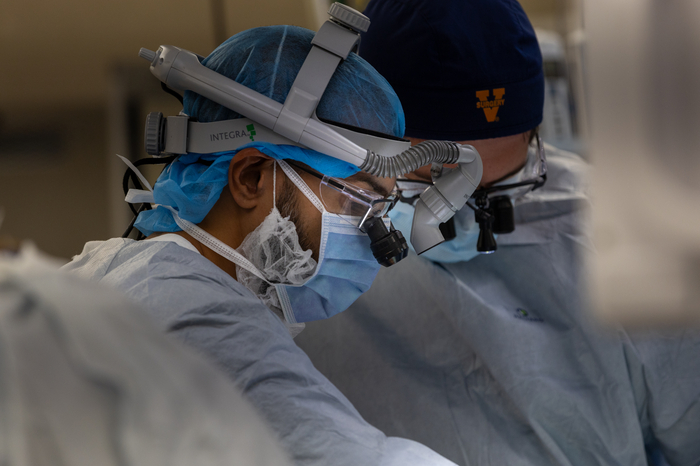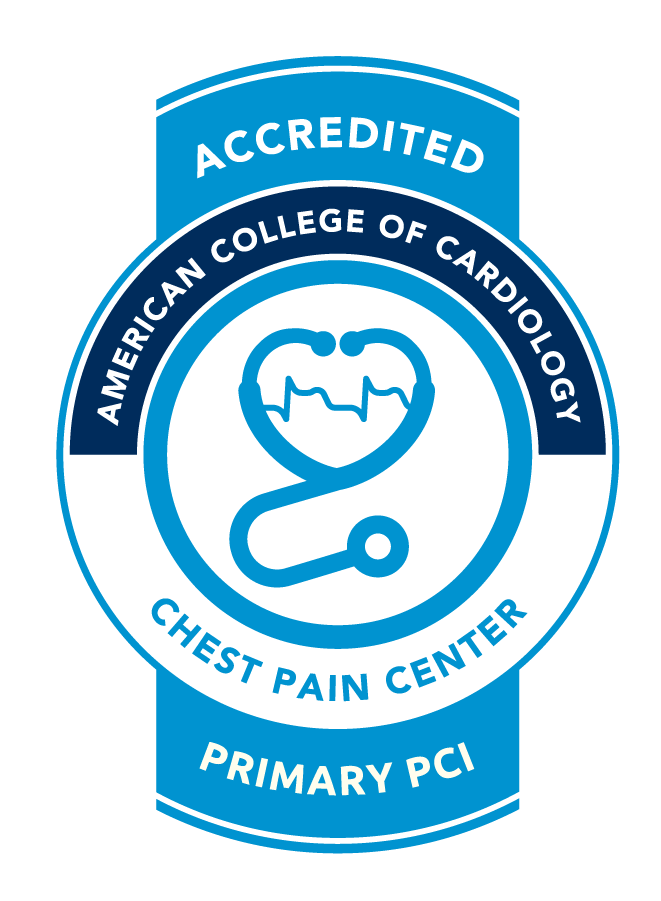Heart Disease
Heart Disease
Heart Disease
Heart disease is the leading cause of death in our country. It’s also very treatable. The heart experts at Carilion Clinic have ways to diagnose heart disease earlier than ever before.
Our cardiovascular services teams in Roanoke and across the region have been treating heart disease by rebuilding hearts and repairing blood vessels for years. Our heart doctors are committed to providing the highest quality heart care to the region. We’re even investing in new facilities and equipment to provide state-of-the-art care to more patients.
Here at Carilion Cardiovascular Institute, we use advanced imaging and other tests to learn about the health of your heart. Our cardiologists, heart surgeons and vascular doctors work together to provide the right care.
From medicine and surgery to specialized rehab for your heart, we know heart disease — and how to combat it.
Heart disease is the leading cause of death in our country. It’s also very treatable. The heart experts at Carilion Clinic have ways to diagnose heart disease earlier than ever before.
Our cardiovascular services teams in Roanoke and across the region have been treating heart disease by rebuilding hearts and repairing blood vessels for years. Our heart doctors are committed to providing the highest quality heart care to the region. We’re even investing in new facilities and equipment to provide state-of-the-art care to more patients.
Here at Carilion Cardiovascular Institute, we use advanced imaging and other tests to learn about the health of your heart. Our cardiologists, heart surgeons and vascular doctors work together to provide the right care.
From medicine and surgery to specialized rehab for your heart, we know heart disease — and how to combat it.
Heart disease is any condition that affects the function of your heart.
Your heart’s main job is to push blood through the body. Arteries continually bring blood to your heart. Your heart gets an electrical signal that makes it beat. The heart muscles squeeze, and the valves open and close to let blood flow.
When any of those things isn’t working as it should, that’s heart disease.
You can have heart disease for a long time without noticing. That’s why doctors sometimes call it a “silent” disease. When you do have symptoms, they can range from a fluttering feeling in your chest to shortness of breath and crushing pain.
What Is Heart Disease?
Heart disease is any condition that affects the function of your heart.
Your heart’s main job is to push blood through the body. Arteries continually bring blood to your heart. Your heart gets an electrical signal that makes it beat. The heart muscles squeeze, and the valves open and close to let blood flow.
When any of those things isn’t working as it should, that’s heart disease.
You can have heart disease for a long time without noticing. That’s why doctors sometimes call it a “silent” disease. When you do have symptoms, they can range from a fluttering feeling in your chest to shortness of breath and crushing pain.
There are several different types of heart disease. Untreated, all types of heart disease can lead to heart failure, heart attack or stroke. These are all life-threatening conditions.
The types of heart disease we most often treat are:
- Coronary artery disease (CAD): This is the most common type of heart disease. It happens when the main artery that carries blood to your heart becomes blocked.
- Valve disease: Your heart has 4 valves. If they leak, become too narrow or don’t open and close correctly, it affects your heart’s ability to pump blood.
- Arrhythmia: An arrhythmia is a problem related to how your heart beats. If it beats too fast, too slow or too irregularly, it can lead to heart failure.
- Cardiomyopathy: This is a problem with your heart muscle. Health issues can cause cardiomyopathy, or you may be born with it.
- Congenital heart disease: This is a type of heart disease you’re born with. When children have heart disease, it’s nearly always congenital. (Carilion Children’s treats pediatric heart disease.)
Types of Heart Disease
There are several different types of heart disease. Untreated, all types of heart disease can lead to heart failure, heart attack or stroke. These are all life-threatening conditions.
The types of heart disease we most often treat are:
- Coronary artery disease (CAD): This is the most common type of heart disease. It happens when the main artery that carries blood to your heart becomes blocked.
- Valve disease: Your heart has 4 valves. If they leak, become too narrow or don’t open and close correctly, it affects your heart’s ability to pump blood.
- Arrhythmia: An arrhythmia is a problem related to how your heart beats. If it beats too fast, too slow or too irregularly, it can lead to heart failure.
- Cardiomyopathy: This is a problem with your heart muscle. Health issues can cause cardiomyopathy, or you may be born with it.
- Congenital heart disease: This is a type of heart disease you’re born with. When children have heart disease, it’s nearly always congenital. (Carilion Children’s treats pediatric heart disease.)
Some people are more likely to develop heart disease than others. The factors linked most closely to heart disease are:
- Family history: We know that heart disease can be genetic. Having a parent with heart disease increases your risk.
- Age: Your heart disease risk increases as you get older, especially after 65.
- Other conditions: High blood pressure, high cholesterol and diabetes are closely linked to heart disease.
- Smoking: Smoking has a clear link to heart disease and heart attacks.
- Lifestyle and habits: Physical inactivity, unhealthy eating habits, stress and excessive alcohol use are all linked to heart disease.
While not all heart disease leads to heart attack, it’s important to know the signs of a heart attack. Signs of heart attack differ in men and women, so learn what to look for at Know the Signs.
Risk Factors
Some people are more likely to develop heart disease than others. The factors linked most closely to heart disease are:
- Family history: We know that heart disease can be genetic. Having a parent with heart disease increases your risk.
- Age: Your heart disease risk increases as you get older, especially after 65.
- Other conditions: High blood pressure, high cholesterol and diabetes are closely linked to heart disease.
- Smoking: Smoking has a clear link to heart disease and heart attacks.
- Lifestyle and habits: Physical inactivity, unhealthy eating habits, stress and excessive alcohol use are all linked to heart disease.
While not all heart disease leads to heart attack, it’s important to know the signs of a heart attack. Signs of heart attack differ in men and women, so learn what to look for at Know the Signs.
We treat heart disease based on the type you have, your risk factors and your symptoms.
If you have a strong family history of heart disease and imaging that shows a blocked artery, you’ll need different treatment than someone with a mild, asymptomatic arrhythmia.
If you have risk factors for heart disease and no symptoms, we’ll probably be able to start your treatment with lifestyle changes. But if you’re having a heart attack, you’ll need immediate, lifesaving care.
Cardiology treatments
A cardiologist is like a primary care doctor for your heart.
Your cardiologist may:
- Order blood tests and heart imaging tests
- Talk to you about lifestyle changes you can make
- Prescribe medicines to reduce blood pressure or cholesterol, or to treat blood clotting problems
- Suggest you undergo a minimally invasive procedure
- Recommend open heart surgery
- Refer you to cardiac rehab
Depending on your type of heart disease, they may refer you to other heart specialists. For example, electrophysiologists are cardiologists who specialize in heart rhythm problems. Or if you have issues related to your blood vessels, you might see a vascular surgeon.
Minimally invasive procedures
We do many minimally invasive heart procedures in our heart catheterization lab. You may also have your procedure done in a hybrid operating room, procedure room or an electrophysiology lab.
With catheter procedures, we use the artery in your leg to access your heart instead of making an incision in your chest. With this less invasive technique, we can replace valves, treat arrhythmias and open blocked arteries.
You may need to spend the night in the hospital after your procedure. There is still recovery time, but it’s much less than surgery.
Surgery
For some people with some types of heart disease, surgery is the best treatment. For example, a person with severe CAD may need coronary artery bypass surgery.
Conditions that affect the structure of your heart, including the valves and walls of your heart, sometimes require surgery.
Your doctor will talk with you about the risks and benefits of surgery compared to other treatments. With surgery, our goal is to prevent heart failure, stroke and heart attack.
Cardiac rehab
After surgery or a heart procedure, cardiac rehab can help you recover. This supervised exercise therapy aims to strengthen your heart and lungs. Researchers have shown that cardiac rehab after surgery or a heart attack can improve outcomes.
Our Carilion Cardiac Rehabilitation program helps you recover faster, feel better and get healthier. Our trained specialists use exercise and wellness conditioning to help you regain strength and endurance.
- Aerobic exercise to elevate your heart rate and improve blood flow
- Strength training to improve your muscle strength and stamina
- Education about your heart condition
How We Treat Heart Disease
We treat heart disease based on the type you have, your risk factors and your symptoms.
If you have a strong family history of heart disease and imaging that shows a blocked artery, you’ll need different treatment than someone with a mild, asymptomatic arrhythmia.
If you have risk factors for heart disease and no symptoms, we’ll probably be able to start your treatment with lifestyle changes. But if you’re having a heart attack, you’ll need immediate, lifesaving care.
Cardiology treatments
A cardiologist is like a primary care doctor for your heart.
Your cardiologist may:
- Order blood tests and heart imaging tests
- Talk to you about lifestyle changes you can make
- Prescribe medicines to reduce blood pressure or cholesterol, or to treat blood clotting problems
- Suggest you undergo a minimally invasive procedure
- Recommend open heart surgery
- Refer you to cardiac rehab
Depending on your type of heart disease, they may refer you to other heart specialists. For example, electrophysiologists are cardiologists who specialize in heart rhythm problems. Or if you have issues related to your blood vessels, you might see a vascular surgeon.
Minimally invasive procedures
We do many minimally invasive heart procedures in our heart catheterization lab. You may also have your procedure done in a hybrid operating room, procedure room or an electrophysiology lab.
With catheter procedures, we use the artery in your leg to access your heart instead of making an incision in your chest. With this less invasive technique, we can replace valves, treat arrhythmias and open blocked arteries.
You may need to spend the night in the hospital after your procedure. There is still recovery time, but it’s much less than surgery.
Surgery
For some people with some types of heart disease, surgery is the best treatment. For example, a person with severe CAD may need coronary artery bypass surgery.
Conditions that affect the structure of your heart, including the valves and walls of your heart, sometimes require surgery.
Your doctor will talk with you about the risks and benefits of surgery compared to other treatments. With surgery, our goal is to prevent heart failure, stroke and heart attack.
Cardiac rehab
After surgery or a heart procedure, cardiac rehab can help you recover. This supervised exercise therapy aims to strengthen your heart and lungs. Researchers have shown that cardiac rehab after surgery or a heart attack can improve outcomes.
Our Carilion Cardiac Rehabilitation program helps you recover faster, feel better and get healthier. Our trained specialists use exercise and wellness conditioning to help you regain strength and endurance.
- Aerobic exercise to elevate your heart rate and improve blood flow
- Strength training to improve your muscle strength and stamina
- Education about your heart condition
We treat every type of heart disease, from the routine to the rare. In fact, Carilion offers programs and new heart treatments that are unique to our region, drawing people from across Virginia and neighboring states.

More cardiologists in more places
With 30+ cardiologists and 30+ locations, our cardiology team is one of the largest in the region. We specialize in all areas of heart care and have the most experienced heart catheterization lab in the area.

40+ years of heart surgery
The area's largest and most experienced heart surgery program, we were the first to offer open heart surgery. We also do more than 5,000 minimally invasive procedures a year and have the largest heart catheterization lab in the area.

Lifesaving heart attack care
We’re an accredited Chest Pain Center. This designation means we offer the best possible lifesaving care for heart attacks. We treat more than 700 heart attacks annually, using the protocol that research confirms gets the best outcomes.
Why Choose Carilion Clinic?
We treat every type of heart disease, from the routine to the rare. In fact, Carilion offers programs and new heart treatments that are unique to our region, drawing people from across Virginia and neighboring states.
Health and Wellness

Heart Disease and Women

Mental Health and Your Heart

Shopping and Cooking for Your Heart
Get Care at Carilion Clinic
Your path to better health starts here. Explore comprehensive care options and find the support you need for every step of your wellness journey.
Get Care at Carilion Clinic
Your path to better health starts here. Explore comprehensive care options and find the support you need for every step of your wellness journey.
Get Care at Carilion Clinic
Your path to better health starts here. Explore comprehensive care options and find the support you need for every step of your wellness journey.
Get Care at Carilion Clinic
Your path to better health starts here. Explore comprehensive care options and find the support you need for every step of your wellness journey.
